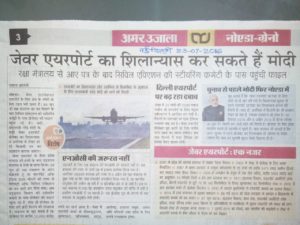GREATER NOIDA: After a Taiwanese consortium and a Dutch telecom company, Chinese commercial and real estate giant Dalian Wanda Group has now expressed interest in investing in Greater Noida, by venturing into lifestyle and commercial real estate.
The company has been exploring opportunities to invest in India since Prime Minister Narendra Modi’s visit to Beijing in May. Its chairman Wang Jianlin met Modi in Delhi earlier this month before visiting Gurgaon to discuss investments that included a mega township. Dalian Wanda is the biggest private property developer in China, apart from being the world’s largest cinema chain operator, with assets worth $86 billion.
On Monday, representatives of the Chinese company met Santosh Yadav, CEO of Yamuna Expressway Industrial Development Authority (YEIDA), and inquired if 500 acres of contiguous land along the expressway could be available. The group, a conglomerate of companies, operates in four major areas — commercial property, luxury hotels, culture and tourism, and department stores.
The Chinese delegation that met Yadav comprised Mathew Abbot, general manager in the acquisitions department for international real estate and senior manager Dillon Wang. Yadav said the officials were on their first visit to Greater Noida and were on a fact-finding tour to explore investment opportunities in Uttar Pradesh.
Yadav informed the delegation about various infrastructure development projects coming up in the area and those open for bidding at present. The visiting delegation has promised to return with specific investment and a consolidated proposal for setting up a mixed land-use township, said Yadav.
An Authority official said that the area adjacent to the Yamuna expressway is attracting interest for large-scale projects with land availability in Noida becoming limited and that it could become a hub for integrated townships and other mixed-land use projects.
Earlier this month, a Taiwanese consortium and a Dutch telecommunications company had shown interest in investing in Greater Noida. The Dutch internet service and telephony provider is scouting for 200 acres of land to set up an IT manufacturing unit in the city’s electronic manufacturing cluster.
The Taiwanese consortium, Taiwan Electrical and Electronic Manufacturers’ Association (TEEMA) had met UP chief secretary Alok Ranjan in Lucknow and expressed interest to invest $200 million in the electronic manufacturing cluster.
